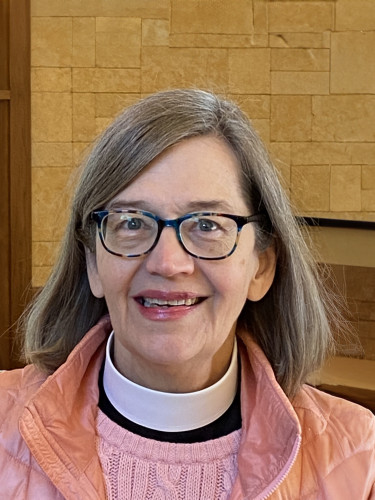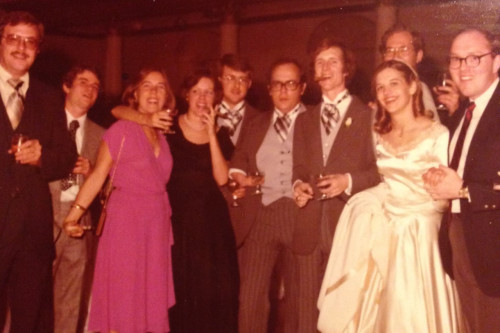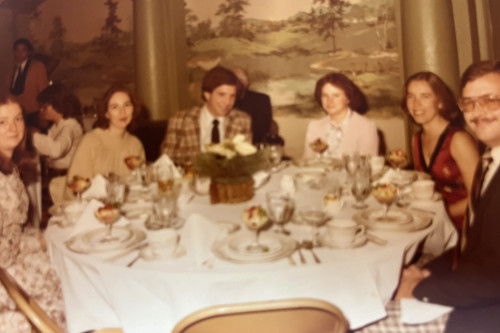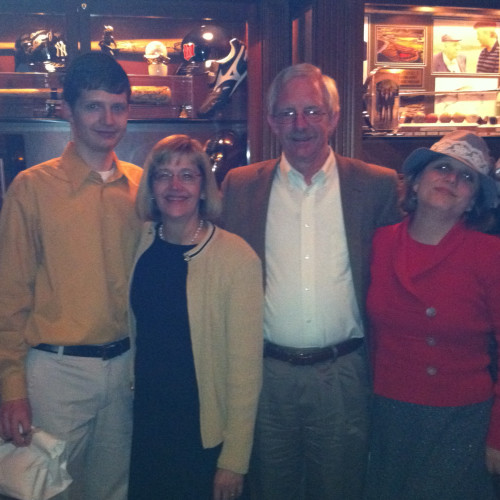“I was raised to believe that from whom much is given, much is expected."

Lifelong members of the Episcopal Church often refer to themselves as “cradle Episcopalians.” The Rev. Lou Tucker Parsons, C’77, T’02, takes this idea one step further. “I sometimes say I’m a DNA Episcopalian,” she laughs. Parsons’ father served as treasurer for the Diocese of Tennessee until the diocese’s division in 1982, and then continued his position in the Diocese of East Tennessee until shortly before his death. Her mother was president of the Tennessee chapter of National Episcopal Church Women (ECW) and represented the group at the ECW’s triennial in 1973. Additionally, Tucker says, “My parents were both very active lay ministers.” If the Episcopal faith isn’t in Parsons’ genes, it’s definitely baked into her childhood.
Sewanee, too, played a notable role in Parsons’ early years. Starting in elementary school, she spent summers at Camp Gailor-Maxon, an Episcopal youth camp that formerly convened at DuBose Conference Center in Monteagle. “I think I was in sixth grade during my first camp session, and the counselors took us to [Sewanee’s] campus,” she says. “I just fell in love with it. I went home and announced to my parents that I knew where I’d be going to college. It was Sewanee.”
There was a problem with Parsons’ plan: Sewanee wasn’t enrolling women at the time. “My parents started laughing,” she recalls. “They said, ‘Well, that will be hard because [Sewanee] is an all-male school!’” Less than five years later, the University’s landscape shifted—and Parsons’ childhood conviction turned into a valid prophecy. Not only did she earn a B.A. in economics at Sewanee, but she also holds an M.Div. from the School of Theology. She and her late husband, Dr. Mark Parsons, C’77, began providing regular gifts to the University decades ago, and Lou has continued to fund multiple Sewanee programs and activities since Mark’s passing in 2013. She is a major contributor to the renovation of the School of Theology’s Hamilton Hall, which began in the fall of 2022 and is slated for completion in September.

Parsons says she considered majoring in chemistry but found that economics was the right fit for her personality. “I love logic, and [economics] is one of the most logical disciplines there is.” Nevertheless, she squeezed in plenty of chemistry courses, and she speculates that she may be the only Sewanee student in history who has taken organic chemistry on a pass-fail basis “just for the fun of it.” In fact, she says, she and Mark stayed in touch with Professor of Chemistry Jim Lowe, who taught organic chemistry, for years, and Lowe attended their wedding in 1979. “He was a dear, dear teacher to both of us.”
Navigating Sewanee’s environment during the University’s first few years as a coed institution could be challenging, according to Parsons. She says she was bolstered by her friendship with Anne Armour Morgret, C’77, P’12, P’14, who was her roommate at both Camp Gailor-Maxon and Sewanee. As undergraduates, she and Morgret, along with several other female students, formed a women’s group to help foster solidarity. Parsons also hosted a program called “Women’s World” on WUTS. “It enabled me to interview a lot of people on campus about various topics related to women,” she says, noting that the show covered issues such as contraception and date rape. (On the lighter side, she says, “Women’s World” always started with a few bars of “It’s a Boy” by The Who—a tongue-in-cheek selection made by Kathryn Weissinger Noxon, C’77, the show’s producer. “I would crack up every time the music led in,” Parsons says.)
A few months after receiving her undergraduate degree, Parsons enrolled in a postgraduate certification program at Emory University, gaining licensure as an ophthalmic technologist and orthoptist. She worked at Grady Memorial Hospital in Atlanta and later became chief of technology for Vanderbilt Eye Clinic. Having struggled with esotropia (misaligned eyes) as a child, Parsons says she felt a natural connection to ophthalmology. Still, she couldn’t ignore a sense that she was meant for the priesthood. “I got a very clear call when I was 16,” she says. “I was at Camp Gailor-Maxon—and I remember it was the clearest thought I’d ever had.”
Like her early premonition that she’d attend Sewanee, Parsons’ call to ministry was tempered by gender restrictions. In 1973, she accompanied her mother to the General Convention of the Episcopal Church, where the ordination of women was debated—and, ultimately, voted down. She remembers discussing her vocational goals with the Rev. Al Minor, C’52, when he was college chaplain for the Diocese of Tennessee. “He said, ‘I don’t doubt your call, but we’re not ordaining women.’” Parsons says Minor nonetheless promised to serve as her mentor. “And 30 years later, he presented me for ordination to the priesthood.”

Parsons landed at the School of Theology after years of living and working around the country with Mark, who paid his way through medical school by serving as a pediatric physician in U.S. military hospitals. It was only when Mark became a pediatric cardiologist at T.C. Thompson Children’s Hospital in Chattanooga that Lou could confidently pursue her formation. Before applying to the seminary, she took theology courses through the School of Theology’s summer program. One of her classmates was the Rev. David Hackett, T’70, who was also her priest at St. Timothy’s Epsicopal Church in Signal Mountain, Tennessee. “On the drive back from [Sewanee] one day, David said, ‘OK, when are you going to seminary?’ And the process started.”
In 1999, 26 years after stepping onto Sewanee’s campus as a freshman, Parsons returned as a seminarian. It wasn’t exactly like time-traveling—though many parts of the University hadn’t changed since the mid-1970s, Parsons’ life had transformed in several important ways. She and Mark were parents by that time, and Lou commuted to the Mountain from Chattanooga for her first year and a half of seminary. After that, she lived part-time in Sewanee with her old friend, Anne Armour Morgret. Managing the logistics of parenting, work, and school was “a juggle,” she says, “but we did it.”
Parsons says she especially enjoyed classes with the Rev. Donald Armentrout, professor of church history and historical theology, as well as C.K. Benedict Professor of Old Testament and Biblical Hebrew the Rev. Becky Wright, P’05, and former Dean of the School of Theology and University Chancellor the Rt. Rev. J. Neil Alexander, P’02, H’02. Another inspiring instructor dates a little further back. “I have to give a shout-out to my sixth grade Sunday school teacher, Till Drew,” she says. “Imagine a bunch of sixth graders going through the Gospels and comparing and contrasting the stories. I had a journal for all of this when I was [in Sunday school]. So when I hit seminary, I probably had one of the strongest backgrounds in Gospel knowledge.”
Since being ordained, Parsons has served as curate for St. James’ Episcopal Church in Knoxville and assistant rector of Grace Church in Chattanooga. In both positions, she worked alongside rectors who graduated from the School of Theology—first, the Rev. Joe Ballard, T'92, and then, the Rev. Gene Smitherman, T'96. “We always shared stories because we had a lot of the same professors,” she says. Currently, she is rector of St. Francis of Assisi Episcopal Church in Ooltewah, Tennessee, and she serves as a chaplain for the police department in Collegedale, Tennessee. In her chaplaincy, “I’ve gained more and more respect for the people who choose to [serve as officers] day in and day out,” she says. “It is really such a gift to us, and I don’t think we realize how much we take for granted in the work they do.”

Parsons stays active in the Sewanee community not only through her philanthropy, but also in her ministry—St. Francis of Assisi is a School of Theology field education site. Recently, she was part of the University’s Names and Places Committee, which, she says, “may be one of the hardest groups I’ve ever worked on.” She notes that members of the committee didn’t agree on every point of discussion, but “regardless of where we stood on any issue, we could talk. That’s a gift in this day and age.”
The ability to hold meaningful conversations comes with a Sewanee degree, Parsons says. “One of the gifts of a liberal arts education, from my viewpoint, is that I can talk to just about anybody.” She adds that this skill “has served me well because it carries over whether you’re in a clinical setting or you’re sitting in somebody’s living room.”
With the renovation of Hamilton Hall nearly complete, donors like Parsons will soon be able to see the fruit of their investments. The Rev. Casey Perkins, T’22, who serves as the School of Theology’s director of development, likens Hamilton Hall’s progress to other major changes enabled by the seminary’s supporters. “Gifts from School of Theology alumni and friends shape our community in ways that aren’t always visible,” he says. “The amazing transformation of Hamilton Hall parallels the spiritual and intellectual growth that seminarians experience, which wouldn’t be possible without scholarships and financial aid. Truly, every gift to the seminary catalyzes some type of enrichment.”
Parsons says she has always benefited from charitable role models. “I was raised to believe that from whom much is given, much is expected. Both of my parents were very generous in their time, treasure, and talents.” Her husband exemplified the same values, she says. “Mark just adored Sewanee. I couldn’t do any of this without his generosity.”

